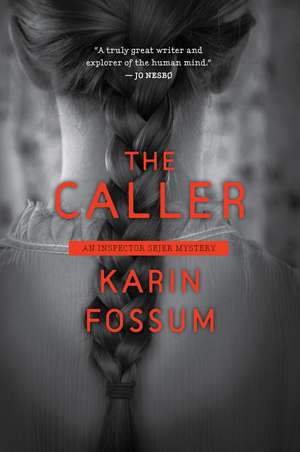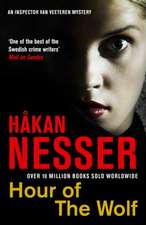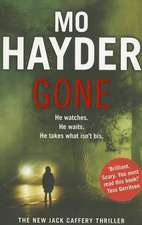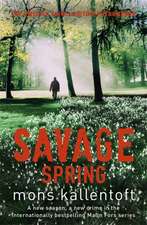The Caller: Inspector Sejer Mysteries
Autor Karin Fossum Traducere de K. E. Semmelen Limba Engleză Paperback – 5 aug 2013
“Pranks
can
have
lethal
consequences,
even
when
they
seem
harmless
to
start
with
.
.
.
A
poison
bonbon
that
ranks
with
the
best
of
Ruth
Rendell.”—Stephen
King
inEntertainment
Weekly
One mild summer evening, a young couple are enjoying dinner while their daughter sleeps peacefully in her stroller under a tree. When her mother steps outside she is stunned: the child is covered in blood.
Inspector Sejer is called to the hospital to meet the family. Mercifully, the child is unharmed, but the parents are deeply shaken, and Sejer spends the evening trying to understand why anyone would carry out such a sinister prank. Then, just before midnight, somebody rings his doorbell.
No one is at the door, but the caller has left a small gray envelope on Sejer’s mat. From his living room window, the inspector watches a figure disappear into the darkness. Inside the envelope Sejer finds a postcard bearing a short message: Hell begins now.
“No one can thoroughly chill the blood the way Karin Fossum can . . . will put you away, no questions asked.”—Los Angeles Times
One mild summer evening, a young couple are enjoying dinner while their daughter sleeps peacefully in her stroller under a tree. When her mother steps outside she is stunned: the child is covered in blood.
Inspector Sejer is called to the hospital to meet the family. Mercifully, the child is unharmed, but the parents are deeply shaken, and Sejer spends the evening trying to understand why anyone would carry out such a sinister prank. Then, just before midnight, somebody rings his doorbell.
No one is at the door, but the caller has left a small gray envelope on Sejer’s mat. From his living room window, the inspector watches a figure disappear into the darkness. Inside the envelope Sejer finds a postcard bearing a short message: Hell begins now.
“No one can thoroughly chill the blood the way Karin Fossum can . . . will put you away, no questions asked.”—Los Angeles Times
| Toate formatele și edițiile | Preț | Express |
|---|---|---|
| Paperback (2) | 105.36 lei 3-5 săpt. | |
| HMH Books – 5 aug 2013 | 105.36 lei 3-5 săpt. | |
| Vintage Publishing – 19 iul 2012 | 106.26 lei 3-5 săpt. | +9.16 lei 7-13 zile |
Preț: 105.36 lei
Nou
Puncte Express: 158
Preț estimativ în valută:
20.16€ • 21.99$ • 16.100£
20.16€ • 21.99$ • 16.100£
Carte disponibilă
Livrare economică 03-17 aprilie
Preluare comenzi: 021 569.72.76
Specificații
ISBN-13: 9780544002180
ISBN-10: 0544002180
Pagini: 256
Dimensiuni: 135 x 203 x 16 mm
Greutate: 0.2 kg
Editura: HMH Books
Colecția Mariner Books
Seria Inspector Sejer Mysteries
Locul publicării:United States
ISBN-10: 0544002180
Pagini: 256
Dimensiuni: 135 x 203 x 16 mm
Greutate: 0.2 kg
Editura: HMH Books
Colecția Mariner Books
Seria Inspector Sejer Mysteries
Locul publicării:United States
Notă biografică
KARIN
FOSSUM’s
Inspector
Sejer
series
has
been
published
in
more
than
30
countries.
She
is
the
recipient
of
a
Gumshoe
Award
and
theLos
Angeles
TimesBook
Prize
for
Mystery/Thriller.
Extras
1
The child slept in a pram behind the house.
The pram was from Brio, and the child was an eight-month-old girl. She lay under a crocheted blanket, wearing a matching bonnet with a string fastened under her chin. The pram sat under the shade of a maple tree; behind the tree the forest stood like a black wall. The mother was in the kitchen. She couldn’t see the pram through the window, but she wasn’t concerned about her sleeping baby, not for an instant.
Pottering about thoroughly content, she was light as a ballerina on her feet, not a single worry in her heart. She had everything a woman could dream of: beauty, health and love. A husband, a child, and a home and garden with rhododendrons and lush flowers. She held life in the palm of her hand.
She looked at the three photographs hanging on the kitchen wall. In one photograph, taken under the maple, she wore a flowery dress. In another her husband, Karsten, was on the front porch. The last was a photograph of her and Karsten together on the sofa, the child between them. The girl’s name was Margrete. The arrangement of the three photos made her smile. One plus one is surely three, she thought — it is truly a miracle. Now she saw that miracle everywhere. In the sunlight cascading through the windows, in the thin white curtains fl uttering in the
breeze.
At the worktop she energetically kneaded a smooth, lukewarm dough between her fingers. She was making a chicken and chanterelle quiche, while Margrete slept beneath the maple in her little bonnet, she, too, smooth and warm under the blanket. Her little heart pumped a modest amount of blood, and it colored her cheeks pink. Her scent was a mixture of sour milk and soap. The blanket and bonnet had been crocheted by her French grandmother.
She slept heavily, and with open hands, as only a baby can.
Lily rolled the dough on a marble slate. As she swung the rolling pin, her body swayed and her skirt billowed around her legs — like a dance by the worktop.
It was summer and warm, and she was bare-legged. She set the pastry in a pie dish, poked it with a fork and trimmed the edges. Then she put a roast chicken on the chopping board. Poor little thing, she thought, and tore its thighs off. She liked the cracking sound the cartilage made when tearing from the bone. Light and tender, the meat let go easily, and she succumbed to the temptation to stick a piece in her mouth. It’s good, she thought, it has just enough seasoning, and it’s lean too. She filled the pie dish and sprinkled on Cheddar cheese. Then she checked the time. She didn’t worry about Margrete. If the child sneezed she would know it immediately. If she coughed or hiccupped, or began to cry, she would know. Because there was a bond between them, a bond as thick as a mooring line. Even the slightest tug would reach her like a vibration.
Margrete’s in my head, she thought, in my blood and in my fingers.
Margrete’s in my heart.
If anyone were to harm her, I would know. Or so she thought. She went about her business calmly. But at the back of the house, someone crept out of the dense forest and in one bound reached the pram. He pushed the crocheted blanket to the side, and Lily didn’t feel anything at all.
The quiche began to turn golden.
The cheese had melted, and bubbled like lava. She glanced out the window and saw Karsten as he pulled into the driveway in his red Honda SUV. The table was set, the china old and dignified; in each glass a white napkin opened like a fan. She switched on the lights, stepped back and tilted her head, evaluating the result. She hoped her husband would see that she’d gone out of her way, that she always went out of her way. She smoothed her skirt and ran her hands through her hair. Other couples fight, she thought, other couples divorce. But that won’t happen to us; we know better. We understand that love is a plant that requires tender care. Some people spread all this rubbish about being blinded by love. But she’d never understood as much as she did now, had never had this insight. Had never had such clarity of vision, or such uncompromising values. She went into the bathroom and brushed her hair. The excitement of her husband’s return, the oven’s heat and the low July sunlight spilling into the room made her cheeks flush and her eyes sparkle. When he stepped into the kitchen, she was ready with a bottle of Farris mineral water and a slight, elegant tilt to her hips. He carried a stack of post, she noticed, newspapers and a few window envelopes. He set them on the worktop, then went to the oven and squatted down, peering through the glass.
“It looks delicious,” he said. “Is it ready?”
“Probably,” she replied. “Margrete is sleeping in the pram. She’s slept quite a while. Maybe we should wake her — otherwise it’ll be hard getting her to sleep tonight.” She reconsidered. Cocked her head and looked at her husband through full black eyelashes. “Or maybe we can wait until after dinner, so we can have a little peace while we eat. Chicken and chanterelle,” she said, nodding at the oven. She slipped on a pair of oven gloves, removed the quiche and set it down on a cooling rack.
It was burning hot.
“She’ll certainly forgive us,” her husband said.
His voice was deep and gravelly. He stood at his full height, put his arms around her waist and escorted her across the room. They both laughed because she was wearing the oven gloves; he had that look she loved so much, that teasing look she could never resist. Now he led her into the lounge, past the dining table to the sofa.
“Karsten,” she whispered. But it was a weak protest. She felt like dough between his hands; she felt kneaded and rolled and poked with a fork.
“Lily,” he whispered, mimicking her voice.
They fell together on to the sofa.
They didn’t hear a peep out of the child beneath the tree.
Afterward they ate in silence.
He said nothing about the meal, or about the table that had been so beautifully set, but he continued to look at her with approval. Lily, the eyes said, the things you do. He had green eyes, large and clear. Because she wanted to stay thin, she tried not to eat too much, even though the quiche was delicious. Karsten was also thin. His thighs were rock hard. A thick mane of dark hair, always a little too long in the back, made him look cheeky and attractive. She couldn’t imagine him gaining weight and losing his shape, or his hair, as many men did when they approached forty. She saw it happening to others, but it didn’t apply to them. Nothing could sever what they had together, neither gravity nor the test of time.
“Will you clear the table?” she asked when they had finished eating. “I’ll get Margrete.”
Immediately he began to collect the plates and glasses.
He was quick and a tad abrupt in his movements, clacking the porcelain between his fingers, and she held her breath; she’d inherited it from her grandmother. She went into the hallway to put on her shoes. She opened the door to the warmth of the sun, the mild, gentle breeze, and the smells from the grass and forest. Then she rounded the corner of the house and walked towards the maple.
A terrible foreboding came over her.
She had shut Margrete out of her mind.
She moved faster now, to make up for what she’d done. Something about the pram was strange, she thought. It was right where she’d put it, near the trunk of the maple, but the blanket was crumpled. There’s so much activity in these little ones, she thought, as she fought her terror. Because now she saw the blood. When she pulled the blanket off, she froze. Margrete was covered in blood. Lily fell to the ground. Lay there, writhing, unable to get up. She wanted to throw up. Felt something sour force its way up her throat, and she emitted a terrifying scream.
Karsten ran round the corner. He saw her contorted on the ground, and noticed the blood, slick and nearly black. He reached the pram in four steps, grabbed Margrete and held her against his chest. Shouted at Lily to get the car.
“Go, Lily!” he shouted. “Go!”
She moaned in response. He shouted louder. He roared like a wild animal, and the roar forced her, finally, to act. She rose and ran to the garage. Realized she needed the keys. Continued into the house and found them on a hook in the hallway. Then she was behind the wheel, backing out. With Margrete in his arms, Karsten yanked open the door and got in. He examined her body, looked under the clothes.
“I think she’s bleeding from the mouth,” he gasped. “I can’t tell. I don’t know how to make it stop! Can’t you drive any faster? Drive faster, Lily!”
Later, neither would remember the drive to the Central Hospital. Karsten had some vague memories of running past the reception desk and pushing open the glass doors. A wild sprint through the corridors with his daughter bleeding in his arms, searching for help. Lily remembered nothing. The world spun so fast it made her dizzy. She ran after Karsten, dashing like a hunted hare that knows the end is near.
They were stopped by two nurses. One of them took Margrete and disappeared through a door. “Stay here!” she shouted.
It was an order.
Then she was gone.
The doors were made of mottled glass, the kind you can’t see through. Here, at the end of the corridor, was a small waiting area, and they sat on separate chairs. There was nothing to say. After a few minutes, Karsten walked to the water cooler by the window. He pulled a paper cup from the machine, filled it and held it out to Lily. She knocked it out of his hand with a scream.
“She was making sounds,” he said. “You heard it. She was breathing, Lily. I’m absolutely sure of that.” He paced the room. “They have to stop it! She’ll get a blood transfusion. We made it here quickly.”
Lily didn’t respond. A teenager with his arm in a sling walked up and down the corridor. Clearly curious about the drama unfolding just a few meters away, he stared openly at them.
“Why is it taking so long?” Lily whispered. “What are they doing?”
It was as though she were inside a wire drum rotating at high speed. It wasn’t life, and it wasn’t death. Later they would both refer to these minutes as pure hell, a hell that ended when a nurse came through the glass doors with Margrete in her arms. She was wrapped in a white blanket. To his amazement, Karsten saw that she jabbed at the air with her hands.
“She’s completely unharmed,” the nurse said.
Karsten took her from the nurse. Felt her little body in his arms. It was warm all over.
With nervous hands he began unfolding the blanket. Margrete, wearing a disposable nappy, was otherwise naked in the blanket.
“She’s completely unharmed,” the nurse repeated. “It wasn’t her blood. We’ve called the police.”
The child slept in a pram behind the house.
The pram was from Brio, and the child was an eight-month-old girl. She lay under a crocheted blanket, wearing a matching bonnet with a string fastened under her chin. The pram sat under the shade of a maple tree; behind the tree the forest stood like a black wall. The mother was in the kitchen. She couldn’t see the pram through the window, but she wasn’t concerned about her sleeping baby, not for an instant.
Pottering about thoroughly content, she was light as a ballerina on her feet, not a single worry in her heart. She had everything a woman could dream of: beauty, health and love. A husband, a child, and a home and garden with rhododendrons and lush flowers. She held life in the palm of her hand.
She looked at the three photographs hanging on the kitchen wall. In one photograph, taken under the maple, she wore a flowery dress. In another her husband, Karsten, was on the front porch. The last was a photograph of her and Karsten together on the sofa, the child between them. The girl’s name was Margrete. The arrangement of the three photos made her smile. One plus one is surely three, she thought — it is truly a miracle. Now she saw that miracle everywhere. In the sunlight cascading through the windows, in the thin white curtains fl uttering in the
breeze.
At the worktop she energetically kneaded a smooth, lukewarm dough between her fingers. She was making a chicken and chanterelle quiche, while Margrete slept beneath the maple in her little bonnet, she, too, smooth and warm under the blanket. Her little heart pumped a modest amount of blood, and it colored her cheeks pink. Her scent was a mixture of sour milk and soap. The blanket and bonnet had been crocheted by her French grandmother.
She slept heavily, and with open hands, as only a baby can.
Lily rolled the dough on a marble slate. As she swung the rolling pin, her body swayed and her skirt billowed around her legs — like a dance by the worktop.
It was summer and warm, and she was bare-legged. She set the pastry in a pie dish, poked it with a fork and trimmed the edges. Then she put a roast chicken on the chopping board. Poor little thing, she thought, and tore its thighs off. She liked the cracking sound the cartilage made when tearing from the bone. Light and tender, the meat let go easily, and she succumbed to the temptation to stick a piece in her mouth. It’s good, she thought, it has just enough seasoning, and it’s lean too. She filled the pie dish and sprinkled on Cheddar cheese. Then she checked the time. She didn’t worry about Margrete. If the child sneezed she would know it immediately. If she coughed or hiccupped, or began to cry, she would know. Because there was a bond between them, a bond as thick as a mooring line. Even the slightest tug would reach her like a vibration.
Margrete’s in my head, she thought, in my blood and in my fingers.
Margrete’s in my heart.
If anyone were to harm her, I would know. Or so she thought. She went about her business calmly. But at the back of the house, someone crept out of the dense forest and in one bound reached the pram. He pushed the crocheted blanket to the side, and Lily didn’t feel anything at all.
The quiche began to turn golden.
The cheese had melted, and bubbled like lava. She glanced out the window and saw Karsten as he pulled into the driveway in his red Honda SUV. The table was set, the china old and dignified; in each glass a white napkin opened like a fan. She switched on the lights, stepped back and tilted her head, evaluating the result. She hoped her husband would see that she’d gone out of her way, that she always went out of her way. She smoothed her skirt and ran her hands through her hair. Other couples fight, she thought, other couples divorce. But that won’t happen to us; we know better. We understand that love is a plant that requires tender care. Some people spread all this rubbish about being blinded by love. But she’d never understood as much as she did now, had never had this insight. Had never had such clarity of vision, or such uncompromising values. She went into the bathroom and brushed her hair. The excitement of her husband’s return, the oven’s heat and the low July sunlight spilling into the room made her cheeks flush and her eyes sparkle. When he stepped into the kitchen, she was ready with a bottle of Farris mineral water and a slight, elegant tilt to her hips. He carried a stack of post, she noticed, newspapers and a few window envelopes. He set them on the worktop, then went to the oven and squatted down, peering through the glass.
“It looks delicious,” he said. “Is it ready?”
“Probably,” she replied. “Margrete is sleeping in the pram. She’s slept quite a while. Maybe we should wake her — otherwise it’ll be hard getting her to sleep tonight.” She reconsidered. Cocked her head and looked at her husband through full black eyelashes. “Or maybe we can wait until after dinner, so we can have a little peace while we eat. Chicken and chanterelle,” she said, nodding at the oven. She slipped on a pair of oven gloves, removed the quiche and set it down on a cooling rack.
It was burning hot.
“She’ll certainly forgive us,” her husband said.
His voice was deep and gravelly. He stood at his full height, put his arms around her waist and escorted her across the room. They both laughed because she was wearing the oven gloves; he had that look she loved so much, that teasing look she could never resist. Now he led her into the lounge, past the dining table to the sofa.
“Karsten,” she whispered. But it was a weak protest. She felt like dough between his hands; she felt kneaded and rolled and poked with a fork.
“Lily,” he whispered, mimicking her voice.
They fell together on to the sofa.
They didn’t hear a peep out of the child beneath the tree.
Afterward they ate in silence.
He said nothing about the meal, or about the table that had been so beautifully set, but he continued to look at her with approval. Lily, the eyes said, the things you do. He had green eyes, large and clear. Because she wanted to stay thin, she tried not to eat too much, even though the quiche was delicious. Karsten was also thin. His thighs were rock hard. A thick mane of dark hair, always a little too long in the back, made him look cheeky and attractive. She couldn’t imagine him gaining weight and losing his shape, or his hair, as many men did when they approached forty. She saw it happening to others, but it didn’t apply to them. Nothing could sever what they had together, neither gravity nor the test of time.
“Will you clear the table?” she asked when they had finished eating. “I’ll get Margrete.”
Immediately he began to collect the plates and glasses.
He was quick and a tad abrupt in his movements, clacking the porcelain between his fingers, and she held her breath; she’d inherited it from her grandmother. She went into the hallway to put on her shoes. She opened the door to the warmth of the sun, the mild, gentle breeze, and the smells from the grass and forest. Then she rounded the corner of the house and walked towards the maple.
A terrible foreboding came over her.
She had shut Margrete out of her mind.
She moved faster now, to make up for what she’d done. Something about the pram was strange, she thought. It was right where she’d put it, near the trunk of the maple, but the blanket was crumpled. There’s so much activity in these little ones, she thought, as she fought her terror. Because now she saw the blood. When she pulled the blanket off, she froze. Margrete was covered in blood. Lily fell to the ground. Lay there, writhing, unable to get up. She wanted to throw up. Felt something sour force its way up her throat, and she emitted a terrifying scream.
Karsten ran round the corner. He saw her contorted on the ground, and noticed the blood, slick and nearly black. He reached the pram in four steps, grabbed Margrete and held her against his chest. Shouted at Lily to get the car.
“Go, Lily!” he shouted. “Go!”
She moaned in response. He shouted louder. He roared like a wild animal, and the roar forced her, finally, to act. She rose and ran to the garage. Realized she needed the keys. Continued into the house and found them on a hook in the hallway. Then she was behind the wheel, backing out. With Margrete in his arms, Karsten yanked open the door and got in. He examined her body, looked under the clothes.
“I think she’s bleeding from the mouth,” he gasped. “I can’t tell. I don’t know how to make it stop! Can’t you drive any faster? Drive faster, Lily!”
Later, neither would remember the drive to the Central Hospital. Karsten had some vague memories of running past the reception desk and pushing open the glass doors. A wild sprint through the corridors with his daughter bleeding in his arms, searching for help. Lily remembered nothing. The world spun so fast it made her dizzy. She ran after Karsten, dashing like a hunted hare that knows the end is near.
They were stopped by two nurses. One of them took Margrete and disappeared through a door. “Stay here!” she shouted.
It was an order.
Then she was gone.
The doors were made of mottled glass, the kind you can’t see through. Here, at the end of the corridor, was a small waiting area, and they sat on separate chairs. There was nothing to say. After a few minutes, Karsten walked to the water cooler by the window. He pulled a paper cup from the machine, filled it and held it out to Lily. She knocked it out of his hand with a scream.
“She was making sounds,” he said. “You heard it. She was breathing, Lily. I’m absolutely sure of that.” He paced the room. “They have to stop it! She’ll get a blood transfusion. We made it here quickly.”
Lily didn’t respond. A teenager with his arm in a sling walked up and down the corridor. Clearly curious about the drama unfolding just a few meters away, he stared openly at them.
“Why is it taking so long?” Lily whispered. “What are they doing?”
It was as though she were inside a wire drum rotating at high speed. It wasn’t life, and it wasn’t death. Later they would both refer to these minutes as pure hell, a hell that ended when a nurse came through the glass doors with Margrete in her arms. She was wrapped in a white blanket. To his amazement, Karsten saw that she jabbed at the air with her hands.
“She’s completely unharmed,” the nurse said.
Karsten took her from the nurse. Felt her little body in his arms. It was warm all over.
With nervous hands he began unfolding the blanket. Margrete, wearing a disposable nappy, was otherwise naked in the blanket.
“She’s completely unharmed,” the nurse repeated. “It wasn’t her blood. We’ve called the police.”
Descriere
When
Inspector
Sejer
receives
a
postcard
with
the
message
"Hell
begins
now,"
he
sets
out
to
uncover
who's behind
a
string
of
cruel
pranks
that
have
thrown
the
peaceful
town
of
Bjerkas
into
unrest,
in
this
chilling
new
installment
of
the
Inspector
Konrad
Sejer
series
from
"the
next
Scandinavian
literary
superstar"
(Chicago
Tribune),
acclaimed
Norwegian
mystery
writer
Karin
Fossum.





















